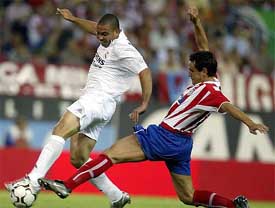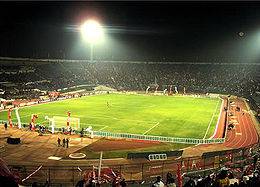
Though the cold war may have ended fifteen years ago, a new Russian-American fight is developing within the Premier League.
Unless you've been asleep for the last three years, you'll know that Chelsea and Manchester United have been taken over by foreigners. In Chelsea's case, by post-Soviet billionaire Roman Abramovich and in ManU's case by Tampa Bay Buccaneers' owner Malcom Glazer. The Russian contingent was boosted last January when Portsmouth was acquired by Alexandre Gaydamak; Cleveland Brown's owner Randy Lerner did good business acquiring Aston Villa about a month ago.
What's been intriguing about this is the reaction of the English public. The post-bosman influx of foreign players still atracts the odd whine ten years later. The gradual disappearance of English coaches from the league also was the cause of much hand-wringing. However, we haven't yet heard much in the way of lamentations about the disappearance of the English
owner.
Now possibly this is down to local factors
. Portsmouth was already owned by a foreigner, Milan Mandaric. Neither Chelsea's Ken Bates not Villa's Doug Ellis were exactly home-town heroes. ManU's new owners certainly aroused opprobrium, but this was as much because of the financial terms of the deal as it was because of the buyer's place of residence. Also, being a publicly listed company, ManU rather crucially had no "owner"
per se prior to Glazer's arrival.
Indeed, the only real shot at the newcomers has come from Arsenal, who famously accused Abramovich of "parking his Russian tanks on our lawn and firing 50 pound notes at us" during a failed attempt to buy Thierry Henry. To the extent that Abramovich's origins have been high-lighted, it has not been because of his Slavic or Jewish origins, but rather because of the perceived shadiness of the way he came by his mega-bucks during Yeltsin's "loans-for-shares" schemes of the mid-90s.
Now in today's Guardian comes additional
evidence that Boris Berezovsky, a former mentor of Abramovich's, is actually the money behind MSI, the strange sports company fronted by enigmatic British-Iranian-Canadian Jia Koorabchian which owns the Tevez and Mascherano contracts and which allegedly is attempting to purchase West Ham. 3-2 to the Russians? Possibly. Or it could mean a Russian civil war is about to break loose - Berezovsky and Abramovich allegedly fell out after the latter chose not to oppose Valdimir Putin when Berezovsky was chased into exile.
Either way, English football's big money and loose ownership rules seems likely to attract an increasingly bizarre group of international owners. Former Prime Minister Thaksin of Thailand (the Thai Berlusconi) has been linked with Liverpool, as has Muammar Gaddafi (whose family already has a seat on the board at Juventus due to the Libyan State Oil Company Tamoil's investment). Fulham's Mohammed Al-fayed is unlikely to remain the league's only Arab owner for long: Gulf footy-philes are unlikley to want to keep pouring petrodollars into the Qatari league forever and Arsenal and Spurs must surely look like tempting targets. Leeds, Sunderland, Newcastle, and Everton, with their large fan bases and underperforming assets would make excellent targets for the next NFL owner who wants "in" to real football.
Nor can one rule out a major Chinese or Southeast-Asian mogul making a move into English football. Don't laugh - on a Saturday night in Cambodia it is possible to watch four live Premiership matches simulateneously, so the Asian advertising benefits alone must be worth millions.
Foreign fans, foreign players, foreign coaches and now foreign owners. The only new frontier that globalization can push is if FAs were actually to start taking launching hostile take-overs against one another. I can think of one or two that could use it...
***
UPDATE 15/9: This morning's Guardian is
reporting that Arsenal are in takeover talks with Russian businessman Oleg Deripaska, a man worth roughly $10 billion whose major business interests are in aluminum and electricty. Arsenal VP David Dein reportedly approached both Deripaska and oil magnate Vladimir Potanin about financing back in the fall of 2003 - both reportedly declined to invest amid uncertainties surrounding the financing of Emirates stadium (a factor which allegedly also pushed Abramovich away from making a bid for Arsenal earlier that year). Now that Emirates is built, the offers may come pouring in...
 Four obvious thoughts about Saturday's game:
Four obvious thoughts about Saturday's game:











